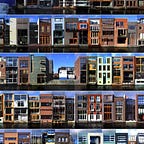Bootleggers & Baptists
Republished with the permission of Cathy Reisenwitz
San Francisco like Auckland is one of the world’s most unaffordable cities for housing. In Auckland and New Zealand the progressive side of the political spectrum acknowledge the moral challenge of fixing the housing crisis. The solution has yet to be implemented (although that might change if a progressive coalition of parties win enough votes in the September election), but at least the first step of acknowledging the problem has been taken. In San Francisco, the progressive narrative is more conflicted, with some progressive groups giving their moral voice to alliances with more conservative groups -to obstruct the supply of more homes.
Cathy Reisenwitz from San Francisco explains this dynamic.
Should Sacramento Have a Say Over Your Neighborhood?
This week SB 35, which disempowers communities from blocking more housing, heads to the State Senate for a vote.
“Local cities and communities should have a say in the way they approach housing, not Sacramento,” Brandon Harami wrote in a comment on California State Senator Scott Wiener’s Facebook post. “A one-solution-fits-all approach is not the way to help communities grow.”
No one likes the idea of Sacramento telling cities and jurisdictions what they can and can’t do. But democracy is just voters, and voters don’t always make the right choice.
The problem SB 35 is designed to solve
In 2016 San Francisco built one home for every 1.8 new residents. Considering we’re still in a crunch and not everyone has roommates, that’s nowhere near enough.
All else equal, when demand rises, but supply doesn’t, then prices rise too. Avocados are expensive because hipsters decided avocados were the thing to eat faster than farmers could make more. If supply suddenly exceeded demand, Millennials wouldn’t be spending our mortgage money on toast smeared with creamy plant fat. Or on rent.
To deal with the rent part, each Bay Area jurisdiction has a quota of how much new housing they have to build. Unfortunately, most of them are behind. That’s what SB 35 is supposed to solve.
But why aren’t SF jurisdictions meeting our housing quotas? And why do we need quotas in the first place? The money is there. Why aren’t the developers building?
Meet the opposition
Two main factions oppose building in San Francisco. First, we have the progressives. They want to block building entirely or block just market-rate housing and only allow affordable housing.
Homeowners make up the other faction. They support building more housing, but only outside their neighborhoods.
The recent fight against pro-housing bill HOME-SF is an example of the two camps working together to block housing. According to the San Francisco Chronicle’s Rachel Swan, Supervisor Katy Tang’s “progressive colleagues” and “westside homeowners” killed the first version of Home-SF. The progressives said that “it didn’t demand enough of developers,” and the homeowners said that “it would cause new real estate projects to flood their neighborhoods.”
Progressives and homeowners are the Bootleggers and Baptists of housing policy.
In the Prohibition Era, the Baptists and Bootleggers worked in tandem, and sometimes together, to keep alcohol illegal. The former because they thought it was the cause of crime, joblessness, and moral decay. The latter because prohibition was profitable. The Baptists did the writing, speaking, and marching. The bootleggers did the kneecapping and funding.
The Bootleggers
The Bay Area’s most powerful neighborhood groups want to block housing because they don’t want poorer people to move in.
“High density housing is ugly, creates its own set of problems, and negates why people moved out of an urban setting,” the San Mateo County Private Property Rights Facebook page wrote in response to a development proposal for Redwood City. “Send the activists packing is the solution.”
That was via Daniel Camp. SF YIMBY shared this gem:
Sorry, my eardrum is vibrating a little bit from all this dog whistling.
The Baptists
Progressives think market-rate housing causes displacement, speculation, and gentrification. But it’s the shortage of housing in the most desirable areas of the city that’s causing SF’s poorer neighborhoods to gentrify.
What would actually happen if Telegraph Hill weren’t allowed to block development? Oakland would not gentrify and its residents would not be displaced. Developers build in the Mission because poor immigrants don’t have the time, money, and energy to prohibit building as effectively as their richer neighbors.
Like the Baptists, the progressives think banning vice makes it go away. But history has shown time and time again that not only does prohibition not work — whether alcohol, drugs, or housing — its ill effects hit the poor particularly hard.
SB 35 says cities which fail to meet their quotas can’t reject new housing proposals if they meet existing zoning requirements and include a certain percentage of affordable units.
At times, democracy has stood in the way of justice. Democracy is better than dictatorship. But democracy is just voters, and voters aren’t always right. Voters supported Prohibition because we didn’t understand that while alcohol abuse is bad, banning it is worse. We supported redlining because white people didn’t want to let black people move into our neighborhoods. And we consistently vote to block housing for the same reasons.
When that happens, people of conscience must stand up to the Baptists and Bootleggers and demand that government stop doing what’s popular, and start doing what’s right.
Cathy Reisenwitz writes about software for a living, sex on the side, and policy for fun. Her column “Unintended Consequences” appears regularly in the Bay City Beacon. She’s pro-sex, pro-feminism, and pro-market. Sign up for her newsletter and follow her on Twitter.
